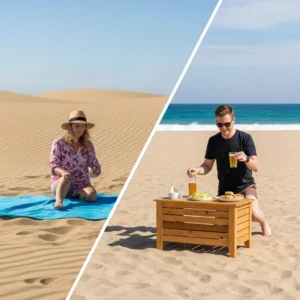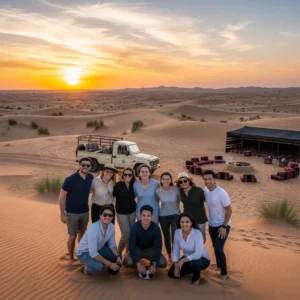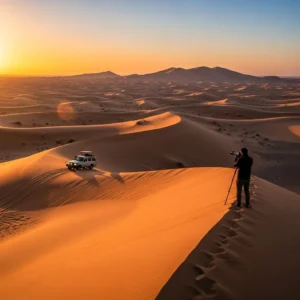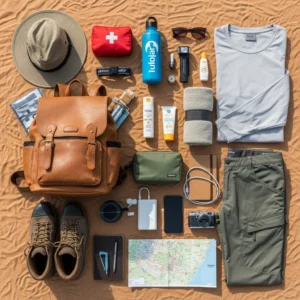A Feast in the Dunes: The Ultimate Foodie’s Guide to Dubai Desert Safari Food
For the discerning foodie, the true magic of a Dubai desert safari lies beyond the rolling dunes and thrilling rides; it’s found in the rich, aromatic, and diverse world of desert safari food. While the adventure activities provide the adrenaline, the culinary journey provides the soul. It’s a feast that tells a story of ancient traditions, warm hospitality, and the vibrant flavors of Arabia.
Many travelers are surprised to discover that the desert safari food experience is far more than just a simple barbecue. It’s a multi-stage culinary event, starting with a traditional welcome and moving through a symphony of salads, dips, grilled meats, hearty main courses, and delectable desserts. It’s a central part of the cultural immersion.
This is your ultimate foodie guide to the delights in the dunes. We will take you on a course-by-course exploration, uncovering the secrets behind the most iconic dishes, from the smoky allure of the live BBQ to the sweet, syrupy bliss of Emirati desserts.
Understanding the culinary landscape will elevate your safari from a simple tour to an unforgettable gastronomic adventure. A superior dining experience, like those curated by https://royaldesertadventures.ae/, is a key indicator of a high-quality safari.
More Than a Meal: The Culture of Bedouin Hospitality
To truly appreciate the desert safari food, one must first understand the culture of hospitality from which it originates. For the Bedouin people, the original inhabitants of the desert, sharing food and drink was a sacred ritual and a symbol of welcome and generosity.
The Symbolism of Dates and Coffee (Gahwa)
Upon arrival at any camp, you will be welcomed with Gahwa (Arabic coffee) and dates. This is not just a refreshment; it’s a centuries-old tradition. Offering coffee is a sign of respect and friendship. The dates, a superfood that can grow in the harsh desert climate, symbolize the life-giving properties of the land.
The Tradition of Communal Dining
The safari dinner is served buffet-style, and guests sit together in a communal majlis (seating area). This reflects the Bedouin tradition of sharing meals as a community. It’s an atmosphere designed to foster conversation and shared enjoyment.
The Importance of Freshness and Flavor
Bedouin cooking is traditionally based on simple, fresh ingredients, but with a masterful use of aromatic spices like cardamom, saffron, turmeric, and thyme. This philosophy carries through to the modern desert safari food experience, where the emphasis is on fresh preparation and rich, memorable flavors.
The Culinary Journey Begins: Welcome Drinks and Appetizers
Your gastronomic adventure starts the moment you step out of the 4×4 and into the serene ambiance of the desert camp.
The Welcome Ritual: Gahwa (Arabic Coffee)
- The History and Significance: Gahwa is a cornerstone of Emirati hospitality, so important that it is inscribed on the UNESCO list of Intangible Cultural Heritage. It is a symbol of generosity and is served on all important occasions.
- The Ingredients: This is not your typical coffee. It is made from lightly roasted green coffee beans and is heavily spiced, most notably with crushed cardamom. Saffron is often added for color and aroma. It is unsweetened and has a unique, aromatic, and slightly bitter taste.
- The Serving Etiquette: Gahwa is served in a small, handleless cup called a finjaan. It is polite to accept at least one cup. When you have had enough, you simply shake the cup gently from side to side before handing it back to your host.
Nature’s Candy: The Vital Role of Dates
Dates are served alongside the coffee, and their natural sweetness provides the perfect balance to the spiced Gahwa. They are a staple of the Arabian diet, packed with energy and nutrients.
Savory Starters: The Appetizer Spread
While you settle in and enjoy the sunset, a selection of savory starters is often served. These “pre-dinner” bites are designed to whet your appetite. Popular options include crispy vegetable samosas or fatayer (small, stuffed pastries), and sometimes falafel, the iconic crispy chickpea fritters.
The Main Event: A Deep Dive into the Desert Safari Food Buffet
As the stars begin to emerge, the main buffet is opened, revealing a lavish spread of dishes. This is the heart of the desert safari food experience.
The Mezze Station: A Symphony of Salads and Dips
The cold station is a vibrant and healthy start to the meal, featuring a variety of classic Middle Eastern salads and dips, served with fresh bread.
- Hummus: The world-famous classic. A creamy, smooth dip made from blended chickpeas, tahini (sesame paste), lemon juice, and garlic. It’s a must-try.
- Moutabel: Often confused with Baba Ghanoush, Moutabel is a smoky, rich, and creamy dip made from roasted eggplant blended with yogurt, tahini, and garlic.
- Tabbouleh: A zesty and refreshing salad made from finely chopped parsley, mint, tomatoes, onions, and a little bulgur wheat, all tossed in a lemon and olive oil dressing.
- Fattoush: A colorful and crunchy “bread salad.” It features mixed greens, cucumber, and tomatoes, tossed in a tangy sumac vinaigrette and topped with pieces of crispy, fried Khubz (Arabic bread).
From the Grill: The Live BBQ Experience
The centerpiece of the dinner is the live BBQ station, where chefs grill a variety of meats over glowing charcoal, filling the desert air with an irresistible smoky aroma.
- The Meats: The selection almost always includes Shish Tawook (cubes of chicken marinated in yogurt and mild spices), Lamb Kebabs (minced lamb mixed with herbs and spices, formed onto skewers), and often succulent Lamb Chops.
- The Grilling Technique: Cooking over real charcoal is key to the authentic flavor. It imparts a smokiness that simply cannot be replicated by gas grills. The meats are cooked to be tender and juicy.
- Vegetarian Options: Vegetarians are well catered for at the grill. Look for skewers of marinated paneer (Indian cheese) and colorful vegetables like bell peppers, onions, and zucchini.
The Heart of the Feast: Main Courses and Accompaniments
Beyond the grill, a selection of hot main dishes provides depth and substance to the meal.
- Ouzi: This is often the star of the show, especially on more premium safaris. It is a celebratory dish of slow-cooked whole lamb, served over a bed of richly spiced rice that is often studded with nuts and raisins.
- Vegetable Salona: A hearty and traditional Emirati vegetable stew. It’s a comforting and flavorful dish, rich with tomatoes and local spices.
- Biryani: While found across the subcontinent and the Middle East, a chicken or vegetable biryani is a common and beloved feature of the buffet—a fragrant one-pot dish of rice, meat/vegetables, and aromatic spices.
- Freshly Baked Breads: No Middle Eastern meal is complete without bread. Freshly baked Khubz (flatbread) is essential for scooping up all the delicious dips and stews.
The Sweet Finale: Traditional Emirati Desserts
After the savory feast, a selection of sweets provides a perfect end to your culinary journey.
- Luqaimat: These are the quintessential Emirati dessert. They are small, deep-fried dumplings, similar to doughnuts, that are crispy on the outside and pillowy-soft on the inside. They are served drenched in sweet, sticky date syrup (dibs) and sometimes sprinkled with sesame seeds.
- A Platter of Fresh Fruits: To balance the richness of the meal, a beautiful platter of fresh, seasonal fruits like sweet melon, watermelon, and pineapple is always a refreshing and healthy option.
The Luxury Upgrade: What to Expect from a VIP Culinary Experience
For the ultimate foodie, upgrading to a luxury or private safari transforms the desert safari food experience from a buffet to a fine-dining event.
- Private Chef and Live Cooking Stations: Instead of a communal buffet, you will have a private chef preparing your meal at exclusive cooking stations within your private camp.
- Premium Ingredients: The menu is elevated with premium ingredients. This can include higher cuts of meat like Wagyu beef, lamb racks, and grilled seafood like king prawns or lobster.
- A La Carte Service: Your meal is served to you course by course by a personal butler at your private, beautifully set dining table. It’s a restaurant-quality experience under the stars. A premium operator like https://royaldesertadventures.ae/ will excel in delivering this level of culinary service.
Finding Your Feast: How to Choose a Safari for Food Lovers
If food is a top priority for you, do your research. When browsing tours on platforms like https://dubaidesertsafarie.com/ or https://hafiztourism.com/, don’t just look at the price. Dive into the reviews and see what previous guests have said specifically about the food quality, variety, and hygiene. A true foodie safari will consistently receive high praise for its culinary offerings.
Conclusion: A Taste of the Arabian Soul
The desert safari food is so much more than just dinner. It is a vibrant and delicious immersion into the heart of Arabian culture and hospitality. From the symbolic welcome of coffee and dates to the rich, smoky flavors of the BBQ and the sweet delight of Luqaimat, every dish tells a story.
For any food lover traveling to Dubai, paying close attention to the culinary aspect of the safari is essential. It transforms the trip from a simple adventure into a complete sensory experience, leaving you with a taste of the desert that you will remember long after the last grain of sand has been shaken from your shoes.
Frequently Asked Questions: Your Desert Safari Foodie Guide
1. I am a vegetarian/vegan. Will I have enough to eat?
Yes, vegetarians are very well catered for. The Mezze station is almost entirely vegetarian, with hummus, moutabel, tabbouleh, and fattoush. The buffet will also have vegetable salona, biryani, and pasta. The grill will feature vegetable and paneer skewers. For vegans, it’s crucial to inform the operator when booking so they can confirm which dishes are dairy-free (e.g., ensuring dips are not made with yogurt).
2. My child is a very picky eater. What can they eat at the buffet?
This is a common concern for families. The buffet is usually large enough to have several kid-friendly options. You can almost always find plain rice, plain Khubz (bread), and mildly spiced grilled chicken (Shish Tawook). Many buffets also include some form of simple pasta or French fries.
3. Is the food spicy? I have a low tolerance for spice.
The desert safari food is generally flavorful and aromatic rather than “hot” spicy. The marinades and stews use spices like cumin, coriander, turmeric, and cinnamon. Dishes with chili heat are usually served separately or are clearly marked. The food is designed to appeal to a broad international palate, so it is typically very mild.
4. What is “Gahwa” (Arabic coffee) and what does it taste like?
Gahwa is a light, golden-colored coffee made from green coffee beans that are only lightly roasted. Its dominant flavor comes from cardamom, which gives it a fragrant, herbal, and slightly bitter taste. It is served unsweetened in small cups and is a unique and authentic taste of the region.
5. Are alcoholic beverages served at the desert camp?
On most standard desert safaris, alcohol is available for purchase at a cash bar within the camp, but it is not included in the package price. Some luxury or private safaris may include alcoholic beverages as part of their package, but this must be confirmed when booking.
6. How is the food kept fresh and safe to eat in the desert?
Reputable tour operators have very strict food safety and hygiene standards. Food is prepared in professional, licensed kitchens in the city and transported to the desert in temperature-controlled containers. The final grilling and assembly happen live at the camp to ensure maximum freshness.
7. Can I request a special cake for a birthday or anniversary?
Yes, absolutely. Most operators are happy to help you celebrate a special occasion. You can request a cake to be arranged for an additional charge. You must make this request at the time of booking to give them enough time to organize it for you.
8. What is the difference between the buffet on a cheap safari vs. a premium one?
On a very cheap safari, the buffet may be limited in variety, use lower-quality ingredients, and can feel chaotic with long lines. A premium or luxury safari will have a much wider variety of dishes, use higher-quality cuts of meat, feature more live cooking stations, and will be much better organized to ensure a pleasant dining experience.
9. Is the BBQ really cooked live at the camp?
Yes, the grilling is one of the key live elements of the desert safari food experience. You will be able to see and smell the chefs cooking the chicken, kebabs, and lamb chops over charcoal grills at the camp, ensuring the food is served hot and fresh.
10. Are there any seafood options on the menu?
On a standard safari buffet, seafood is not common. The focus is on chicken and lamb. However, on a private or luxury safari, you can often customize your menu to include grilled seafood like king prawns, lobster, or fish for an additional cost.
11. What is the most authentic Emirati dish I should try at the safari?
While many dishes are pan-Arabian, Luqaimat (the sweet dumplings) is a truly iconic and beloved Emirati dessert that you must try. For a main course, if your safari offers Ouzi (slow-cooked lamb on rice), it is a classic celebratory dish of the region and is highly recommended.
12. Is the water provided safe to drink?
Yes, all reputable operators provide sealed, bottled mineral water that is perfectly safe to drink. Both at the camp and in the vehicles, there will be plenty of safe drinking water available to keep you hydrated.
13. I have a severe nut allergy. Is it safe for me to eat at the buffet?
You must exercise extreme caution. You must inform the tour operator of your severe allergy at the time of booking and again when you meet your guide. While they can advise you on which dishes to avoid, there is always a risk of cross-contamination in a large buffet setting. A private safari where you can control the menu is a much safer option for those with severe allergies.
14. What are the typical serving times for dinner at the camp?
After arriving at the camp around sunset (usually 6:30-7:00 PM), the dinner buffet typically opens around 7:30-8:00 PM and will remain open for about an hour. The entertainment shows usually take place during and after this dinner service.
15. Can I go back for second helpings at the buffet?
Yes, absolutely. The dinner is a buffet, and you are welcome to go back for second or even third helpings of your favorite dishes while the buffet is open.
16. Besides the main dinner, are there any other snacks available?
Upon arrival, you will be served welcome appetizers like falafel or samosas. After the main dinner and during the entertainment, the camp will serve the dessert course, which includes Luqaimat and fresh fruits. There are not typically snacks available throughout the entire evening.
17. What is “Ouzi” and how is it prepared?
Ouzi is a lavish and traditional dish often reserved for special occasions. It involves a whole lamb or large pieces of lamb being marinated in a blend of aromatic spices and then cooked very slowly for several hours until it is incredibly tender and falling off the bone. It is then served on a large platter over a bed of spiced and nutty rice.
18. Are the dessert options very sweet?
Yes, traditional Middle Eastern desserts are typically quite sweet. Luqaimat are drenched in a very sweet date syrup. However, the sweetness is often balanced by the availability of a large platter of fresh, juicy fruits like watermelon and melon, which offer a more refreshing end to the meal.
19. Can I bring my own food or drinks to the safari?
Bringing a small, personal snack or a bottle of water is generally fine. However, bringing a large amount of your own food or alcoholic beverages is not permitted. The safari is an all-inclusive experience, and for health and safety reasons, operators do not allow outside catering.
20. What is the one dish that truly defines the desert safari food experience?
While every dish plays a part, the freshly grilled Lamb Kebabs perhaps best define the experience. The smoky aroma of the charcoal grill filling the cool desert air, combined with the rich, spiced flavor of the lamb, is a sensory experience that is completely intertwined with the magic and ambiance of dining under the stars in the Arabian desert.

















